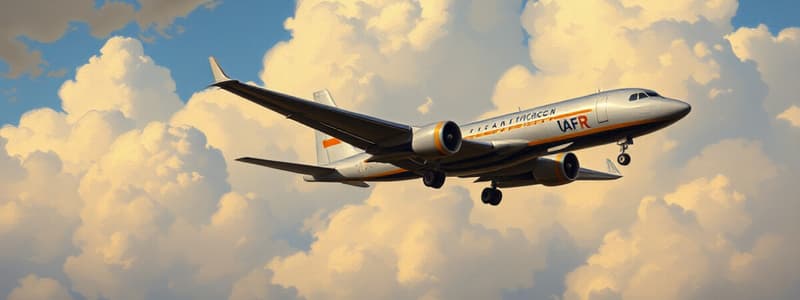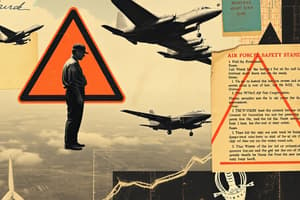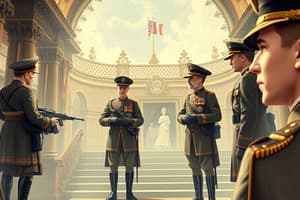Podcast
Questions and Answers
What is the Air Force definition of leadership?
What is the Air Force definition of leadership?
The art and science of influencing and directing people to accomplish the assigned mission.
Why is leadership considered an art?
Why is leadership considered an art?
Because it requires imagination and creative skill.
Why is leadership considered a science?
Why is leadership considered a science?
Because it requires careful study, observation, and experimentation.
Why does leadership influence and direct people?
Why does leadership influence and direct people?
What purpose does a mission serve in leadership?
What purpose does a mission serve in leadership?
What is the official definition of leadership?
What is the official definition of leadership?
What are the three components that most scholars include in their definition of leadership?
What are the three components that most scholars include in their definition of leadership?
What is culture?
What is culture?
Do you need to be a commander to lead?
Do you need to be a commander to lead?
Are leaders born?
Are leaders born?
Are leaders accountable?
Are leaders accountable?
Are leaders bullies?
Are leaders bullies?
Is leadership moral?
Is leadership moral?
Why do leaders need to be visionaries?
Why do leaders need to be visionaries?
Can the idea of being a visionary leader go too far?
Can the idea of being a visionary leader go too far?
Do leaders have to be motivators?
Do leaders have to be motivators?
Can a leader's motivational qualities ever be too much of a good thing?
Can a leader's motivational qualities ever be too much of a good thing?
Why must a leader be an effective communicator?
Why must a leader be an effective communicator?
Flashcards are hidden until you start studying
Study Notes
Air Force Definition of Leadership
- Leadership is defined as "the art and science of influencing and directing people to accomplish the assigned mission."
Art of Leadership
- Leadership is considered an art because it involves creativity and imagination; different leaders may tackle challenges in varying ways.
Science of Leadership
- Leadership also qualifies as a science, requiring study and observation; it relies on understanding cause and effect similar to scientific analyses.
Influence and Direction
- Leaders work through people rather than tools, aiming to motivate individuals to take action and achieve objectives.
Mission Importance
- The mission defines a team's purpose and is a leader’s foremost responsibility, emphasizing the importance of achieving defined objectives.
Universal Definition
- There is no universally accepted definition of "leadership," highlighting its complex and subjective nature.
Core Components of Leadership
- Leadership typically involves three essential elements: the leader, the followers, and the goal.
Culture's Impact
- Culture, encompassing attitudes and values of a civilization, plays a crucial role in shaping leadership approaches, reflecting societal values such as democracy.
Command vs. Leadership
- Leadership is not synonymous with command; effective leadership can exist at any level, regardless of rank.
Nature vs. Nurture in Leadership
- Leaders are made, not born; qualities effective leaders possess can be developed through effort and experience.
Accountability of Leaders
- Historical reasoning suggests that unchecked power often leads to tyranny; thus, leaders should be accountable to those they serve.
Leadership Approach
- Genuine leadership involves positive influence rather than coercion; effective leaders inspire rather than intimidate.
Morality in Leadership
- Leadership carries a moral imperative; poor leadership implies a lack of direction and responsibility.
Visionary Leadership
- Visionary leaders envision transformative futures and inspire their teams towards exciting goals by creating a compelling vision.
Caution in Visionary Leadership
- Overly ambitious visions can lead to impracticality; leaders must balance aspiration with realism.
Motivation in Leadership
- Successful leaders are adept motivators, understanding the dynamics of issuing challenges and encouraging achievement.
Caution in Motivational Leadership
- Excessive motivation can backfire, leading to negative outcomes; leaders must ensure their encouragement promotes positive actions.
Importance of Communication
- Effective communication is crucial for leaders to convey ideas clearly and meaningfully to others, ensuring shared understanding and alignment.
Studying That Suits You
Use AI to generate personalized quizzes and flashcards to suit your learning preferences.




